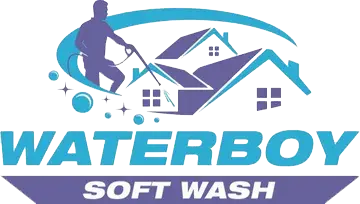Maintaining outdoor surfaces in top condition is crucial for both appearance and safety, and concrete cleaning plays a significant role in this process. Whether it’s a driveway, sidewalk, patio, or entryway, concrete surfaces around the home collect dirt, grime, algae, and other buildup over time. In Chester County, PA, where weather conditions shift dramatically between seasons, maintaining clean concrete requires not just effort but also the right techniques.
This detailed guide explores the most effective methods for cleaning concrete in Chester County, providing an in-depth look at pressure washing and the key dos and don’ts. Every method discussed here is tailored to match the local environment, ensuring your concrete stays in good shape throughout the year.
Understanding the Importance of Concrete Cleaning
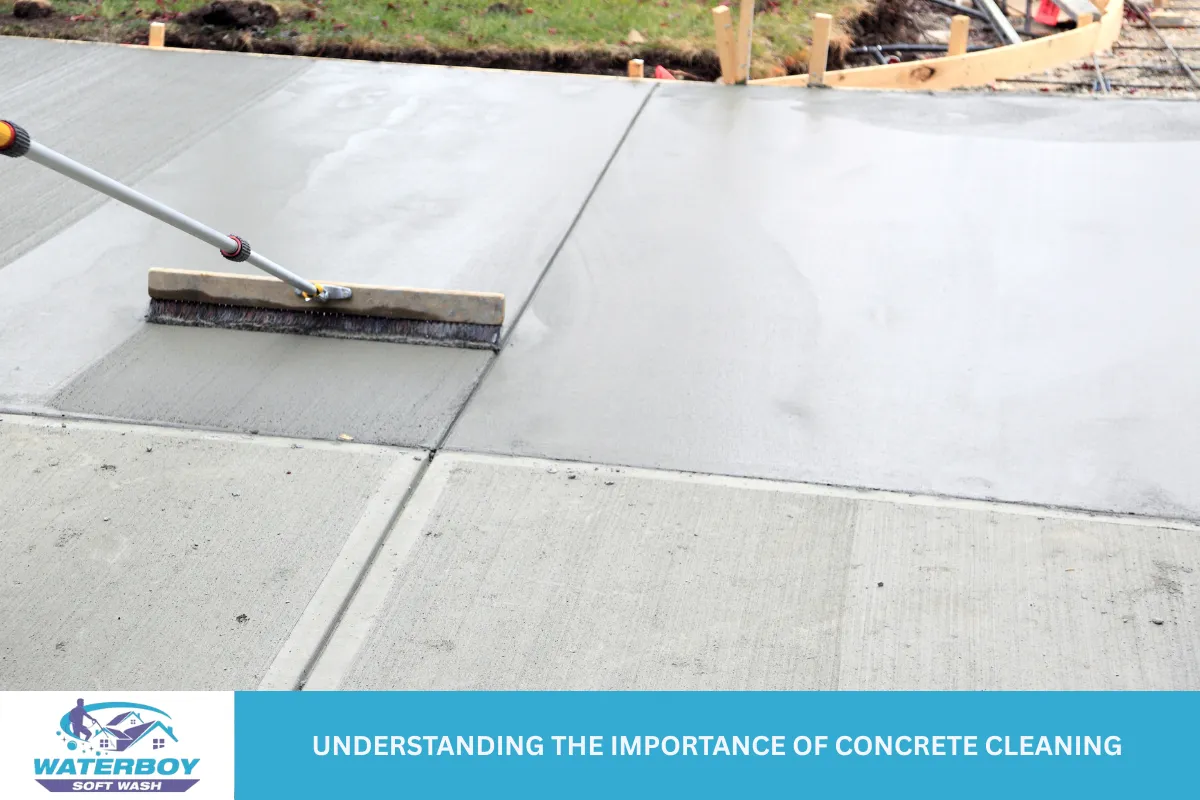
Concrete might look tough, but it’s surprisingly porous. Dirt, water, oils, and chemicals seep into it, causing stains and surface damage. Without proper care, the appearance of concrete surfaces begins to fade, and their durability weakens over time.
In Chester County, the frequent mix of rain, humidity, ice, and road salt during the colder months creates a perfect environment for mold, mildew, and algae to form. These not only stain the surface but also make it slippery and potentially dangerous. Regular cleaning helps preserve the condition of the concrete. Also, it protects the surrounding environment by reducing harmful runoff and buildup.
Methods of Concrete Cleaning: Choosing What Works Best
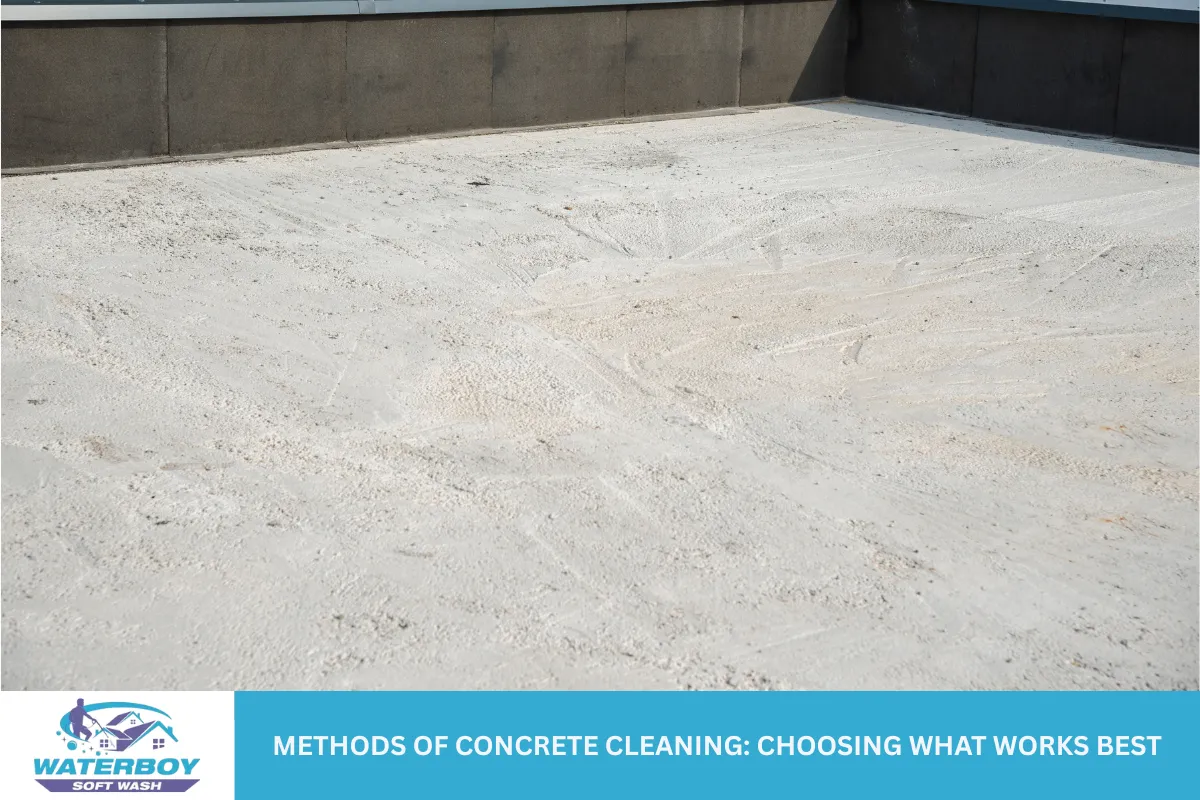
Several reliable methods are available for cleaning concrete. Each one serves a specific purpose and is best suited for a particular type of dirt or surface.
Pressure Washing
Pressure washing uses high-pressure water to remove dirt, algae, oil stains, and other grime from concrete. This method is commonly used in Chester County because of its efficiency and ability to clean large surfaces quickly.
It works by forcing water through a narrow nozzle at pressures ranging from 2,000 to 3,000 PSI. This high pressure breaks up and lifts away the buildup from the concrete without the need for harsh chemicals.
Advantages:
- Cleans deeply and quickly
- Removes tough stains with minimal effort
- Ideal for large outdoor surfaces like driveways and walkways
Considerations:
- Must be used correctly to avoid surface damage
- Not suitable for crumbling or cracked concrete
- Should not be used on decorative or stamped concrete without caution
Soft Washing
Soft washing utilizes significantly lower pressure, combined with specialized cleaning solutions, to gently clean concrete surfaces. It’s perfect for surfaces that can’t handle high pressure or are located near gardens and flower beds.
In Chester County, soft washing is often used for more delicate surfaces or areas shaded by trees where algae and mildew are more likely to grow.
Advantages:
- Safer for older or decorative concrete
- Environmentally friendly with biodegradable cleaners
- Provides long-lasting results by killing algae and mold spores
Considerations:
- Requires cleaning solutions
- Slower process compared to pressure washing
Manual Scrubbing and Spot Cleaning
Some stains, especially those caused by oil, rust, or paint, require hands-on effort. Manual cleaning involves scrubbing the concrete with a stiff-bristle brush and applying chemical or natural cleaners.
While more labor-intensive, this method allows for precision. It is useful for smaller stains that don’t require full-surface cleaning.
Advantages:
- Great for targeting specific problem spots
- Gives more control over pressure and application
- Can be done with basic tools
Considerations:
- Time-consuming
- May not be effective for deep or widespread staining
Pressure Washing Concrete: Safe and Effective Techniques
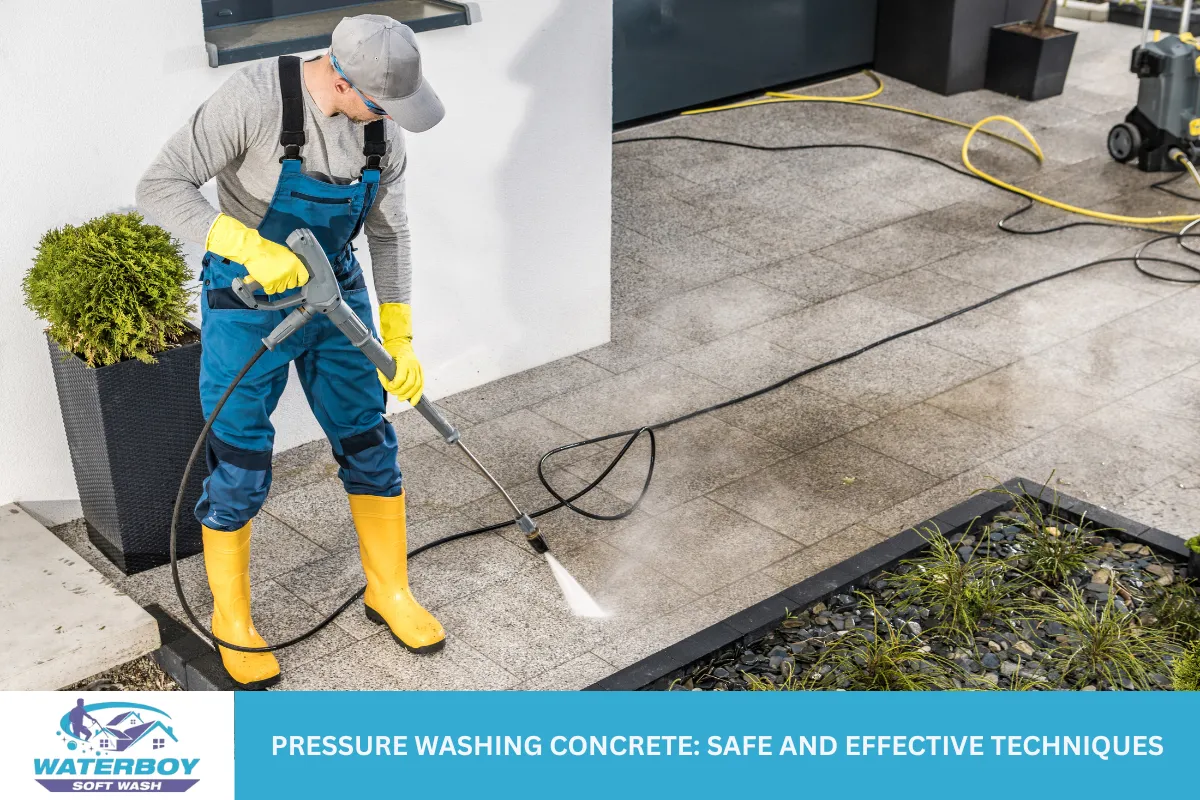
Pressure washing is a powerful tool, but if used improperly, it can cause more harm than good. It’s essential to know how to use this method safely.
Choosing the Right Pressure Level
For concrete, a pressure washer set between 2,500 and 3,000 PSI typically works well. Lower pressures may not clean effectively, while higher pressures can etch the surface or push water into cracks. Always use a pressure washer with adjustable settings to match the surface condition.
Spray Tip Selection
Nozzle tips control the spray angle and strength. A 15-degree or 25-degree tip provides enough power for effective cleaning without causing damage. Avoid narrow tips, such as the 0-degree nozzle, which concentrates all the pressure in one spot and can cause the concrete to gouge.
Maintaining Proper Distance
Keep the spray wand at least 12 inches from the surface to avoid direct impact. Moving in smooth, overlapping passes prevents streaks and ensures a uniform, clean finish. Always start farther back and move closer only as needed.
Pre-Treatment for Stains
Oil or rust stains benefit from a pre-treatment using a degreasing solution or specialized concrete cleaner. Apply the solution and allow it to sit for 10–15 minutes before pressure washing.
Avoiding Surface Damage
Never use pressure washing on concrete with cracks or weak spots. The force of the water can worsen the damage. For such areas, consider using soft washing or spot treatment as an alternative.
Seasonal Timing for Concrete Cleaning in Chester County
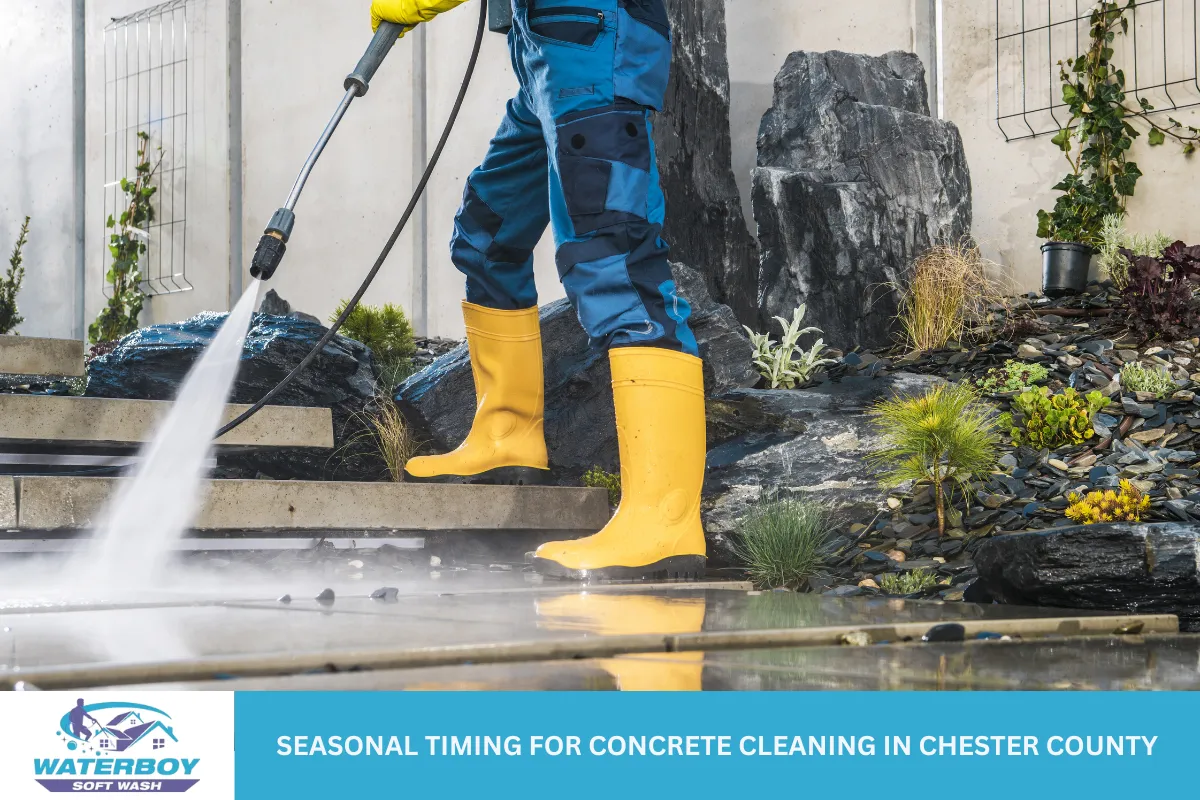
Cleaning concrete at the right time of year helps extend its lifespan and improve results.
Spring
Spring is an ideal time to clean concrete. It removes winter salt, sand, and debris that can wear down surfaces. Cleaning early in the season also prepares patios and walkways for use in warmer weather.
Summer
Warm temperatures help surfaces dry quickly after cleaning, making summer another great season for concrete maintenance. It’s also the perfect time to apply a concrete sealer once surfaces are clean and dry.
Fall
Fall cleaning helps remove leaves and organic debris that can cause staining and promote mold growth. It also prepares your concrete for the harsh winter conditions.
Winter
Concrete cleaning during winter is generally not recommended due to freezing temperatures. Focus instead on spot treatments during warm spells or plan to clean before the cold sets in.
Protecting the Environment During Concrete Cleaning
Being mindful of the environment during cleaning is crucial, especially in a region like Chester County, where runoff can have a significant impact on nearby streams and vegetation.
- Use biodegradable, non-toxic cleaning products when possible.
- Avoid washing chemicals into storm drains or flower beds.
- Collect and properly dispose of wastewater from heavy-duty cleanings.
- Rinse surfaces thoroughly to prevent residue buildup.
These practices help keep both your property and the surrounding environment safe and clean.
Maintaining Concrete After Cleaning
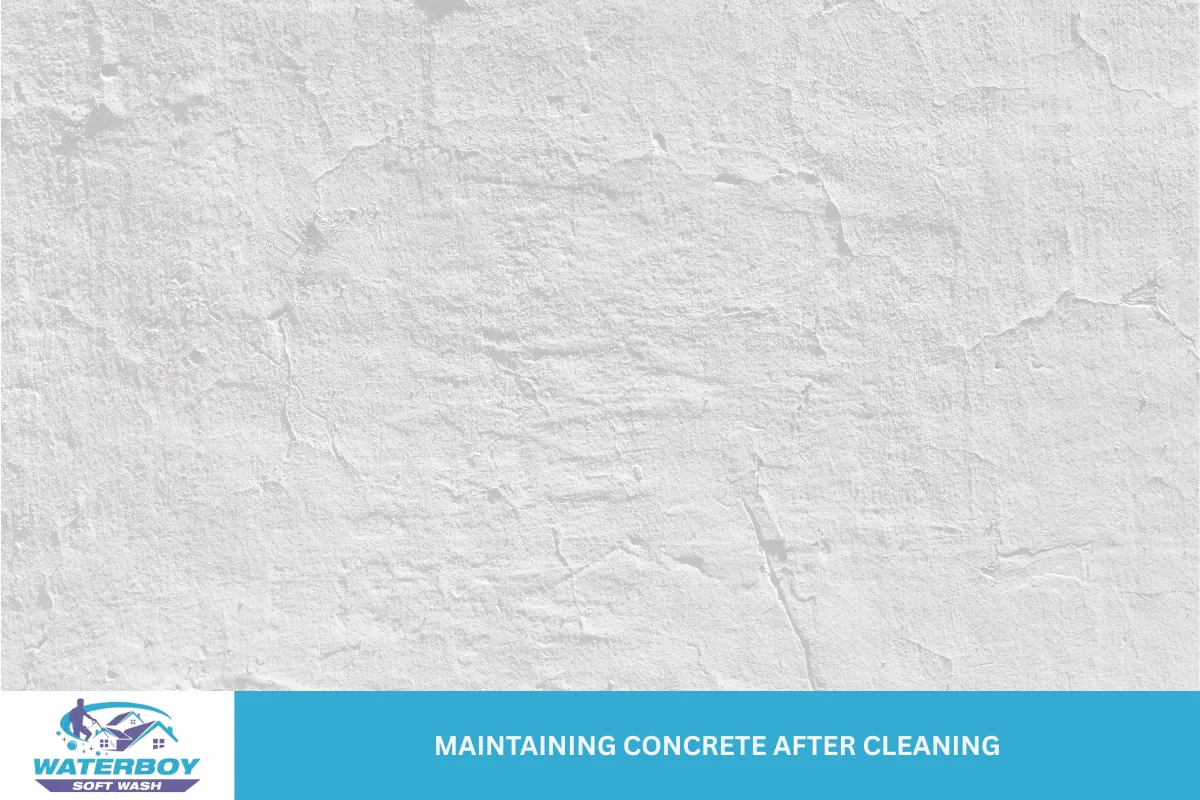
Concrete cleaning isn’t just about removing buildup—it’s also about preserving the surface for as long as possible afterward.
Applying a Concrete Sealer
Sealing your concrete after cleaning protects it from moisture, staining, and surface wear. A quality sealer creates a barrier that prevents grime and liquids from penetrating the surface. Most sealers need reapplication every two to three years.
Regular Sweeping and Rinsing
Basic maintenance, such as sweeping and occasional rinsing with a garden hose, helps prevent dirt from accumulating. It also makes future cleanings easier.
Immediate Spot Cleaning
Cleaning up spills, grease, or stains promptly prevents them from setting in. Use a concrete-safe cleaner and a soft brush for best results.
Common Mistakes to Avoid During Concrete Cleaning
Even with the right tools and intentions, some mistakes can reduce cleaning effectiveness or damage your surface.
- Using excessive pressure that erodes or chips concrete
- Holding the nozzle too close creates lines or etching
- Ignoring pre-cleaning steps like sweeping or rinsing loose debris
- Applying strong chemicals without testing a small area first
- Letting cleaning solutions dry before rinsing, which leaves streaks
Avoiding these errors ensures a smooth, consistent, and safe cleaning process.
Final Thoughts on Cleaning Concrete the Right Way
Concrete surfaces around the home are a valuable part of your property’s structure and aesthetic. Regular cleaning not only keeps them looking their best but also prevents long-term damage from algae, dirt, and seasonal debris. The methods you choose—whether pressure washing, soft washing, or spot scrubbing—should always be matched to the specific needs of your surface and local environment.
In Chester County, where weather conditions and natural surroundings present unique challenges, knowing the right tools and techniques makes all the difference. With proper care and the right approach, your concrete surfaces can stay clean, safe, and attractive for many years.
Chester County Concrete Cleaning – Water Boy Soft Wash
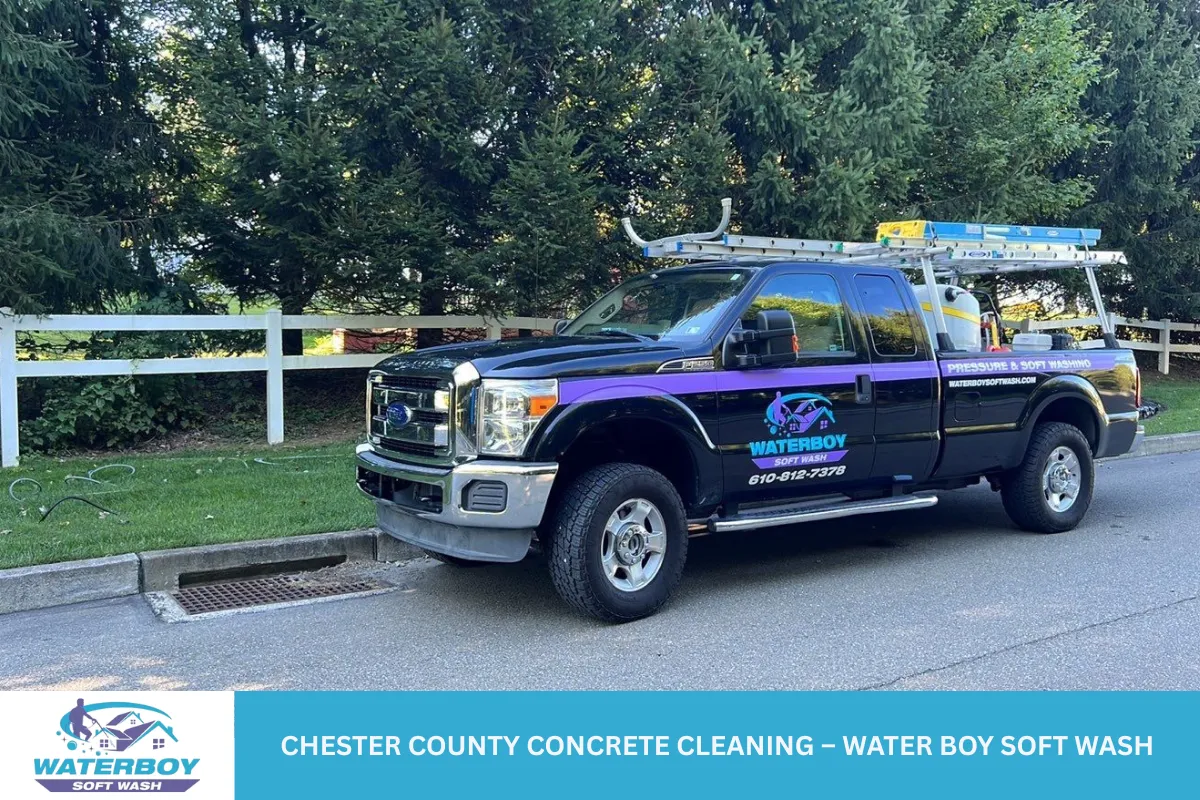
Looking for a reliable way to get your concrete truly clean? Water Boy Soft Wash offers professional concrete cleaning services throughout Chester County, utilizing safe methods that safeguard your surfaces while delivering exceptional results. Whether it’s your driveway, patio, walkway, or sidewalk, we remove built-up dirt, mold, mildew, and stains without causing any damage.
In addition to concrete cleaning, we offer comprehensive exterior services, including house washing, roof cleaning, gutter cleaning, and window washing. Call (610) 812-7378 today and let us take care of your property the right way!
Frequently Asked Questions About Concrete Cleaning and Pressure Washing
What is the ideal water pressure for cleaning concrete surfaces?
The recommended water pressure for cleaning concrete is between 2,500 and 3,000 PSI. This range is powerful enough to remove stubborn stains, such as oil, green scum, and darker scum, without damaging the surface. Using less than 2,000 PSI might not clean effectively, while exceeding 3,000 PSI could make the situation worse by etching the surface or opening small cracks.
To apply the right pressure evenly, use a spray wand that allows consistent control and pair it with a high-pressure hose connected to a hose bib for steady water flow. If you’re dealing with textured stone surfaces or older concrete, opt for a slightly lower PSI to avoid surface wear.
Also, always begin with a small test area before cleaning the full cleaning surface. This ensures the pressure setting and distance are safe for the material. Avoid zero-degree nozzles—use a 25-degree tip for wider, safer coverage.
Can electric pressure washers handle tough concrete cleaning jobs?
Yes, electric pressure washers can handle many concrete cleaning tasks, but they’re best for light to moderate jobs. Most models range from 1,500 to 2,000 PSI, which is lower than gas-powered units. While that’s enough to remove dirt, dust, and light buildup from a stone patio or garage floor, it may struggle with stubborn stains like oil or heavy mildew.
For general maintenance or small surfaces—like upstairs deck railings, steps, or walkways—electric models are quiet, lightweight, and ideal for household use. However, they may not work well for deep-set stains, green scum, or algae on neglected concrete.
Use a sort of soap designed for use with outdoor cleaners, and always check whether the machine includes a built-in detergent tank. If not, you’ll need a separate bottle of soap. Always pair with a high-pressure hose for more effective rinsing.
What type of cleaning solutions should I use for cleaning concrete?
The right cleaning solutions depend on the type of stain and surface. For general cleaning, a mild detergent or specially formulated outdoor cleaner works well. These can remove dirt, grime, and tree dirt without damaging the surface. Look for a bottle of soap labeled safe for stone surfaces and concrete.
For stubborn stains like oil, rust, or mildew, use targeted cleaners:
- Degreasers for oil stains
- Rust removers for orange discoloration
- Mildew and mold removers for green or darker scum
Always test on a small area first. Avoid using bleach directly on concrete, especially on stone patios, as it can cause fading or chemical reactions. Also, avoid cleaners that leave residue, as they can make the situation worse by attracting more dirt.
You can apply cleaners using a spray wand, foam sprayer, or brush, depending on the size and location of the cleaning surface.
How do I prevent damage while pressure washing decorative concrete?
Decorative concrete surfaces—like stamped, colored, or exposed aggregate—require a gentler approach. Excessive water pressure can damage the finish, cause fading, or dislodge the surface texture. To prevent this:
- Use a lower PSI, around 1,500 to 2,000.
- Hold the spray wand 12–18 inches from the cleaning surface.
- Use a 25- or 40-degree nozzle to spread the force.
- Rinse with a high-pressure hose connected to a hose bib for steady flow.
Avoid harsh chemicals that might react with colorants or sealers. Choose cleaning solutions labeled safe for decorative or sealed concrete.
Don’t skip spot testing. For surfaces like stone patios or upstairs deck railings, soft washing with mild outdoor cleaners may be a better option. Also, avoid cleaning in direct sunlight—it can cause cleaners to dry too quickly, resulting in streaks.
What surfaces around my home can safely be cleaned with a pressure washer?
Pressure washing is suitable for many exterior areas, but not all surfaces respond the same. Here’s a list of what’s generally safe:
- Concrete driveways and sidewalks
- Stone surfaces like patios and garden paths
- Deck floors and upstairs deck railings (with adjusted pressure)
- Brick walls
- Vinyl siding
- Wooden fences (with soft washing)
Avoid using high water pressure on painted surfaces, fragile masonry, or loose grout. Always inspect surfaces beforehand for cracks or weak points.
When washing around landscaped areas, use cleaning solutions that are non-toxic and biodegradable. Also, angle the spray wand away from windows, vents, or sensitive materials.
Electric pressure washers may be enough for smaller jobs. For larger areas with stubborn stains or green scum, stronger gas-powered models or professional cleaning may be necessary.
Read more: How to Avoid Damage During Concrete Cleaning in Chester County, Pennsylvania
